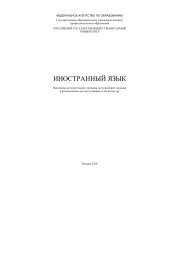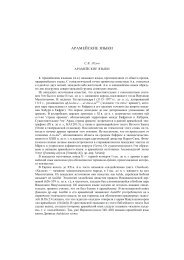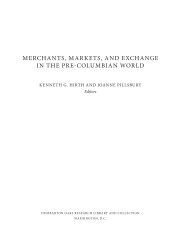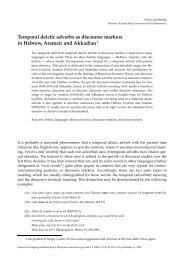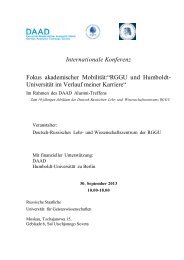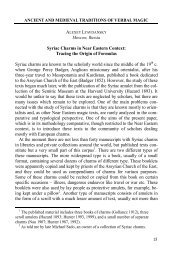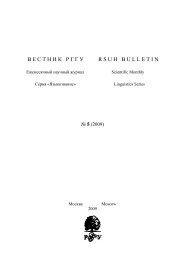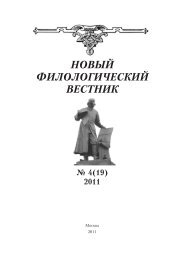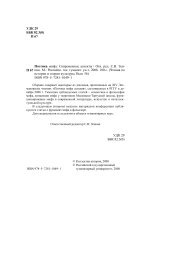Akkadian Sentences about the Present Time (II/2)
Akkadian Sentences about the Present Time (II/2)
Akkadian Sentences about the Present Time (II/2)
You also want an ePaper? Increase the reach of your titles
YUMPU automatically turns print PDFs into web optimized ePapers that Google loves.
770 Morphosyntax and Text Structure in <strong>Akkadian</strong>SC P has been found in <strong>the</strong> following OA texts: 6 TÚG ku-ta-ni i-na sà-e-tima-šu-mì PN 1 ù PN 2 lá-qí-ú ‘6 kutānu-textiles have been taken from <strong>the</strong>sa!utum in <strong>the</strong> name of PN 1 and PN 2 ’ (OAA 1, 111:13 ff. = CCT 4, 13a), 7½ TÚG ku-ta-nu a-na ša-du-e-tim lá-qí-ú ‘7 ½ kutānu-textiles have beentaken for <strong>the</strong> transport tariff’ (ibid. 16 f.); 1 ½ GÍN KÙ.BABBAR ša A-bu-šalimiš-tí Da-da-a ú-lá lá-qí ‘1 ½ Sekel Silber des Abu-šallim sind von Dadā’anicht genommen’ (KUG 22:16–19); KÙ.BABBAR ša lá-qí-ú ‘silver that hasbeen taken’ (CCT 5, 25b:16). Thus, <strong>the</strong> lá-qé-e of Prag I 662 is <strong>the</strong> only“non-technical” example found in OA, but this of course may be due to<strong>the</strong> nature of <strong>the</strong> extant Kültepe archives and incompleteness of mysearch results.Leqûm is <strong>the</strong> head of a well-known idiomatic verb phrase whose directobject is šē¢ūtu ‘contempt, disdain,’ 28 <strong>the</strong> whole being ‘to hold somebodyin contempt.’ From <strong>the</strong> examples quoted in <strong>the</strong> dictionaries (AHw.1222a, CAD L 145b, Š 2 345a), it follows that, with leqûm used in <strong>the</strong> prefixingtenses, šē¢ūtu takes possessive pronouns pointing to <strong>the</strong> patient,e. g. ši-¢ù-us-sà la te-le-qé ‘do not despise her’ (AbB 3, 90:9). When <strong>the</strong>head is used in <strong>the</strong> SC, it can agree ei<strong>the</strong>r with <strong>the</strong> patient, ma-ma-an ša¢up-pì-a ú KÙ.BABBAR-pì a-na a-wa-tim lá i-de 8 -ú šé-¢ù-tí lá-qé ‘Whoever hasnot deposited my tablets or my silver for (my) cause, is contemptible (lit.‘takes my contempt’) (BIN 6, 99:12–16 = Michel 1991, No. 99), or with<strong>the</strong> noun šē¢ūtu: šē¢ūt-ī le-qí-a-at ‘ich bin verachtet’ (lit. *‘my contempt isbeing taken’ = ‘I am a target of contempt’) (AbB 5, 160:10′).In <strong>the</strong> vernacular dialects outside of <strong>the</strong> corpus, <strong>the</strong> SC P is exploitedmostly by <strong>the</strong> Assyrian legalese: it occurs in set expressions uppu laqi ‘it isacquired and taken (into possession)’ (MA legal documents, cf. CAD A 2202b; L 140b), ´arip laqi ‘it is sold and taken over’ (NA legal documents,cf. CAD Ô 105b), once in Middle Assyrian Laws (§ 44: ana šīm gamer la-qíu-ni‘(<strong>the</strong> one who) is taken for <strong>the</strong> full value’), and more times in MA andNA legal documents (CAD L 140a, see also AHw. 545a under “St. Pass.”).↓ The fact that in OB letters <strong>the</strong> SC of leqûm, a transitive verb, is attestedalmost exclusively in A readings requires explanation. The evidencecan be accounted for by <strong>the</strong> suggestion in Loesov 2006:138: P resultativereadings of <strong>the</strong> SC usually describe those P states that are “obthoroughgoingsyntactic description of <strong>the</strong> “Participle” as a habitual agent noun).The e-vocalism of this word is enigmatic anyway. The plene-writing may render aprosodic feature, though this orthographic reflection of <strong>the</strong> “question intonation”has so far been described for OB only. The string e-pu-šu is a Pres. eppušū.28Curiously, <strong>the</strong> noun does not seem to be attested outside of this expression.



